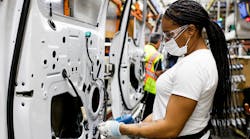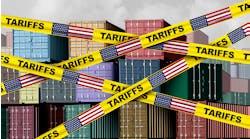The US Has an Emerging Industrial Policy. Biden Should Build on It.
President Biden wants to see U.S. factories humming. “American manufacturing was the ‘Arsenal of Democracy’ in World War II, and it must be part of the engine of American prosperity now,” he said upon signing his “Buy American” executive order on January 25th. Two days later, he issued another order that would replace the federal motor vehicle fleet with American-made electric vehicles.
These executive actions are just the first steps in the Biden manufacturing plan, which includes massive new investments in infrastructure, workforce training, and green technologies; reform of international trade rules; and tax incentives to re-shore manufacturing jobs.
The Biden plan – characterized by some as “misguided” and “awful economics” – has sparked a debate about the wisdom of industrial policy. Largely ignored is the fact that the United States has an emerging industrial policy, created in piece-meal fashion over the last few years.
For sure, this isn’t the kind of industrial policy practiced during the Cold War by Soviet-block nations behind the Iron Curtain. Yet it does involve the government picking winners and losers, but in a targeted manner as might be expected of a nation that values capitalism. This American Industrial Policy is characterized by its focus on capabilities critical to national security, supported by resilient supply chains, and achieved through political consensus. Each attribute deserves elaboration.
A Focus on Capabilities
Since 1980, the U.S. has hemorrhaged manufacturing jobs. Its share of GDP from manufacturing has shrunk. Its trade deficit is soaring. But not all jobs are equal, not all growth is sustainable, and trade deficits are not always bad. What is driving the new American Industrial Policy is the realization that the nation is losing cutting-edge capabilities that create good jobs and offer a comparative advantage. Losing such capabilities, of which there has been no shortage in recent decades (think telecommunications equipment and pharmaceuticals), is a serious wake-up call to policy makers, who only recently have been paying attention.
Critical to National Security
Capabilities critical to US national security matter most. The weakening of the defense industrial base, which is increasingly dependent on foreign supliers, is spurring new federal investments under the Defense Production Act (e.g., the processing of rare earth metals and the scaling up of hypersonic technologies) and the creation of new programs under the National Defense Authorization Act (NDAA) (e.g., the making of semiconductors and printed circuit boards). Tariffs have been imposed on imports of steel and aluminum that threaten to impair national security. The U.S. effectively blocked Chinese tech giant Huawei from U.S. commerce due to security concerns over next-generation wireless technology. U.S. export controls are expanding to cover emerging and foundational technologies with dual (military and civilian) uses. Importantly, such actions reflect a melding of economic security with national security.
Supported by Resilient Supply Chains
The COVID-19 pandemic has drawn worldwide attention to the fragility of global value chains and is prompting U.S. multinational companies to shorten and simplify supplier networks. Government incentives can help. Congress included provisions for reshoring semiconductors and strategic minerals and metals in the NDAA. The Department of Defense announced funding to enhance the security of the US electronics supply chain. Federal contracts have been awarded to reshore production of essential medicines. When re-engineering a U.S. supply chain, a top priority is to identify and eliminate chokepoints—reliance on a sole supplier from a non-allied country.
Achieved Through Political Consensus
The new American Industrial Policy enjoys at least bipartisan support, and often consensus support, which is striking in an otherwise toxic political environment. In recent years, Congress has enacted, by wide margins, reforms to the defense industrial base (NDAA), U.S. export controls (Export Controls Act), and national security review of foreign purchases of U.S. firms (Foreign Investment Risk Review Modernization Act). ‘Buy American’ policies enjoy widespread public support. And lest anyone forget, the outcome of the last two presidential elections was determined by industrial states (Wisconsin, Pennsylvania, and Michigan).
If President Biden wants to advance domestic manufacturing, he should seek to boost critical U.S. capabilities where they can do the most good, such as new products or processes at the technology frontier (e.g., advanced tooling, electric and autonomous cars, Industry 4.0 technologies) and those that have been eroded due to the unfair trade practices of competitor nations (e.g., solar panels and rare earth elements). In other words, he should build upon—but not replace—the emerging American Industrial Policy.
Keith B. Belton is Principal of Pareto Policy Solutions LLC—a consulting firm advancing U.S. competitiveness.




